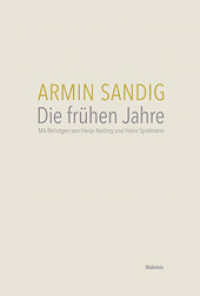Description
(Short description)
Wenn deutsche, englische und französische Prosa zwischen 1914 und 1939 nach der Bedeutung des Ersten Weltkriegs fragt, thematisiert sie oft Veränderungen des täglichen Lebens. Die ethischen Haltungen zu diesem Prozess schlagen auch auf die literarische Gestaltung von Geruchslandschaften durch, die für die Gefühlslenkung wichtig ist. Der Zugang zur Problematik des Leichengeruchs erweist sich als zuverlässiger Indikator jener Haltungen: Teils wird das Thema kriegsgläubig tabuisiert, pikaresk heruntergespielt oder versachlicht, teils werden Motive des Geruchs entrüstet oder gefasst zum Zeichen menschenunwürdiger, bedrohlicher oder sinngebender Kontexte stilisiert. Wie riecht Krieg? Zugänge zur Problematik des Leichengeruchs im Ersten Weltkrieg
(Text)
German, English and French Narratives of 1914-1939 about the significance of the Great War are often concerned with adjustments of peace-specific ways of life to the conditions of warfare. The ethical views on such transitions are manifest in the ways in which the narratives' smellscapes aim to guide the readers' emotional response, and the approach to the problematics of corpse stench can serve as a reliable indicator of a text's ethical stance. In some stories, the topic is devoutly avoided, downplayed in a picaresque fashion, or covered in a coolly detached manner; in others, motifs of corpse stench aim to evoke a sense of indignation, alarm, or countenance as signs of inhumane, threatening, or meaningful contexts.
(Author portrait)
Frank Krause ist emeritierter Professor für German and Comparative Literature an der Goldsmiths, University of London, UK.








